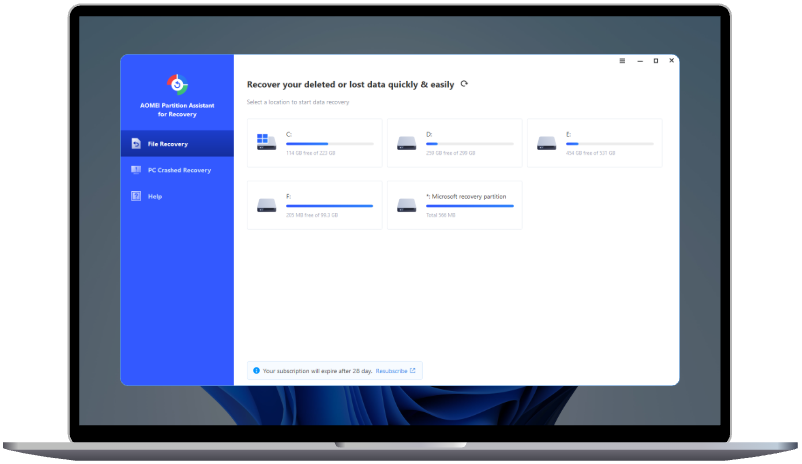[11 Ways] My Folder Disappeared From Windows 11! Recover it Now!
There are 11 ways to help you fix Users Folder disappeared in Windows 11. Both Windows tools and professional data recovery software can help you recover suddenly disappeared User Folder in Windows 11.
User case: My folder disappeared in Windows 11 suddenly!
A sub folder of my Pictures folder has disappeared. I was renaming and moving a few images from the Downloads folder to the Pictures folder, by dragging & dropping in file explorer. When I opened the Pictures folder, suddenly the sub folder and it's contents were not there.
I double checked that hidden files were viewable. I searched the disk for the name of the folder, and the shortcut came up, but it said the item it pointed to has been changed or moved. From explorer, I clicked undo for all the recent actions involving the Downloads and Pictures folders (renaming and moving images), but there was nothing in the history that showed the sub folder being accessed or modified. The folder was accessed earlier, several hours ago. I don't have a restore point I could go back to. How do I find out what happened and fix it?
- Question from Reddit
If you are using Windows 11, a folder suddenly disappeared from Windows 11 can be annoying, but don't worry. There are ways to recover a folder that was deleted, hidden, or moved. If you're having the same problem, please read to know the possible reasons, and then we'll show you some good ways to recover folders that are disappeared from Desktop or File Explorer later in this piece. Let's first look at why folders might disappear from the Desktop before we get to the answers. Some of the methods also suitable for situation where you accidentally deleted Users Folder.
Why does the folder disappear from Windows 11?
There are many reasons will lead to files or folders disappeared from Windows 10/11 for several reasons:
Hidden files: Files or folders may be hidden. To fix this, show hidden files using File Explorer.
Accidental deletion: Files may be deleted by mistake, but professional data recovery tools can help restore them.
Windows update issues: Updates can move files to other locations like the Documents folder or create a temporary user profile.
Corrupted disk indexing: If the disk index is corrupted, files may not appear, making them seem missing.
Hidden desktop icons: Windows sometime will make Desktop icons missing, also including files and shortcuts. Use Windows Search to make them visible again.
Virus infection: A virus might have deleted your folder, and antivirus software may have removed it.
How to recover disappeared folder in Windows 11?
There are 11 fixes that can help you fix folder disappeared from Windows 11. You can choose the one that suits your situations most.
Method 1. Use a professional data recovery tool
The easiest way to fix this is by restoring your files from a backup, however, not everyone has such a habit. If you accidentally deleted folders in Windows 11 and don’t have a backup, you can try using AOMEI Partition Assistant for Recovery or another free data recovery tool for Windows.
- It can fast recover deleted files from Windows, HDD, SSD, USB, and many other devices.
- Keeps files in their original format.
- Supports recovering more than 1000 file types with unlimited data from formatted disks, encrypted drives, corrupted drives.
- Works with NTFS, FAT32, exFAT, ReFS in Windows 11/10/8/7 & Windows Server.
- AOMEI Partition Assistant for Recovery offers Technician versions for business and enterprise uses.
Step 1. Install and launch AOMEI Partition Assistant for Recovery. Choose the exact partition or disk where your temp folder is lost and click Scan.
Step 2. Then, the recovery tool starts to scan and search. lt will execute the “Quickly Scan" first to find your deleted data fast, and then execute the “Deep Scan" for searching other lost data.
Step 3. Once the scan is completed, all deleted files, recycle bins and other missing files will be displayed. Please select the file you would like to recover and then click "Recover".
Step 4. Then, select a folder path to save your recovered files.
Step 5. Wait patiently for this process of recovery to end.
Method 2. Check the Users Folder
Your files or folder can be relocated to a different place, like the Documents folder or the Public folder. Follow the steps below to check your users folder.
Step 1. Open "This PC" from File Explorer. Then, go to the following path.
- C:\Users\UserName\Documents
- C:\Users\Public
Step 2. Check if the files or folder disappeared in Windows 11 are there. You can copy and paste them to their original location.
Method 3. Check the Temp folder
The temp folder stores launch configurations and cached data for installed applications.Check this folder for any missing files or folders.
Step 1. Go to "C:\Users\UserName\AppData\Local\Temp" and access the temp folder.
Step 2. Most of the time, the missing files or folders are found here. It requires some manual steps to retrieve your data.
Method 4. Change to the old User Account
Most likely, when you upgraded to Windows 11, Windows made a new user account and set it as the primary. Please look at the old account to get back your files or folders.
Step 1. Click on the "Start" button, then select the user icon and "Sign out".
Step 2. On the sign-in window, type the required information about your old account. Once switched your accounts, your files or folder should appear in Windows 11.
Method 5. Enable the old Administrator Account
If you upgraded to Windows 11 from an older version of the OS and made a new Microsoft account, your files might be in the old master account. To recover folders disappeared from Desktop or File Explorer, you will need to turn on this account and sign in again.
Step 1. Type "computer management" in the search box and select the top result.
Step 2. Click "Local Users and Groups" and select "Users".
Step 3. Locate the Administrator user and double-click its icon to open the Properties window.
Step 4. In the General tab, leave the "Account is disabled" unchecked and click "Apply" > “OK” to confirm this change.
Step 5. Sign out the current user account and log in again with this Administrator user account.
Method 6. Run Search to recover folder disappeared from Windows 11
Use Windows Search to find specific files and folders on your computer. This is helpful if files are missing from the Windows 11 and 10 Desktop after being moved elsewhere, whether intentionally or accidentally. Follow these steps to use Windows Search:
Step 1. Click the Windows icon in the lower-left corner of the Desktop. Or you can press and hold the Win key on your keyboard.
Step 2. Start typing the name of the file or folder you want to find. Windows will refine the search results as you type. Enter the name of the missing desktop file in the search bar.
Step 3. Check the search results to find the missing desktop documents.
Step 4. Open a document by clicking on it. If you need to open the enclosing folder, right-click and choose Open file location.
Method 7. Check the User Profile
Most likely, your computer logged in with a temporary account. To find out if it is, try the steps below.
Step 1. Go to "Start" > "Settings" > "Accounts" > "Sync your settings".
Step 2. Check if there is a message like "You are logged on with a temporary profile. Roaming options are currently unavailable" displayed at the top.
Step 3. Then, restart your computer and sign in again. It will remove the temporary account and get back your files.
Method 8. Check your Disk
If the index on your hard drive is broken, things might not show up in folders. You need to check the disk index to rule out this option.
Step 1. Open "This PC" in File Explore. Locate your hard drive, right-click it, and select "Properties".
Step 2. In the "Tools" tab, go to the Error checking section and click on the "Check" button.
Step 3. Click "Scan drive" to search for possible errors. It will fix any found errors and restore the hidden files and folders.
Method 9. Modify the Indexing options
If Windows 11 still doesn't show your files, you can change the Indexing Options by following these steps.
Step 1. Press the "Win + S" keys to open the search bar. Type "Indexing options" and select it.
Step 2. In the Indexing options window, click on the "Advanced" option.
Step 3. Navigate to the “Index Settings” tab, and click on the "Rebuild" button under Troubleshooting.
Method 10. Manage Antivirus settings
If the issue with folder disappeared in Windows 11 persists, security software may help resolve it. First, recover deleted files in Windows 11. Second, add items that you want to exclude from your antivirus scan. Start by using data recovery tools such as AOMEI Partition Assistant for Recovery. Next, complete the steps below to configure your antivirus.
Step 1. Type “Windows Security” in the search box and select it. Then, click “Virus & threat protection”.
Step 2. Click “Manage settings”.
Step 3. Go to the Exclusions section, and click "Add or remove exclusions".
Step 4. Click on the “Add an exclusion” button. You can select from files, folders, file types, or processes. A folder exclusion will apply to all subfolders within the folder as well.
Method 11. Recover Users Folder disappeared from Windows 11 with Windows File History
Windows File Recovery is a command-line utility that reserves deleted data. It is available in the Microsoft Store and requires the version of Windows 10 2004 (May 2020 Update) or higher along with Windows 11. If you encounter "Windows File Recovery there was an error parsing your command" error when fixing Users Folder disappeared in Windows 11, please read to get solutions.
Step 1. Check your Version. Click “Settings > System > About” in order, and observe the Windows specifications. If the Version Number is 2004 or higher, you can continue to follow up.
Step 2. Select Microsoft Store and search for “Windows File Recovery”. Choose “Get” to download the tool.
Step 3. Open it, and you will see a Command Prompt window with a few syntax examples.
Step 4. Type the specific command to make the external hard drive data recovery.
To sum up
Finally, the above methods make it easy to fix folder disappeared from Windows 11. After the operating system is updated, they might be hidden, removed, or moved to a different place. You should back up all of your data if you haven't already updated, just in case you lose any files or folders.

